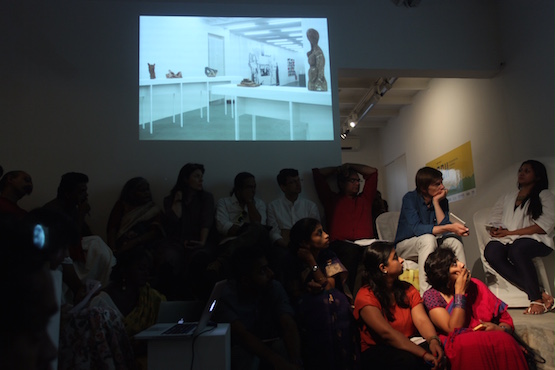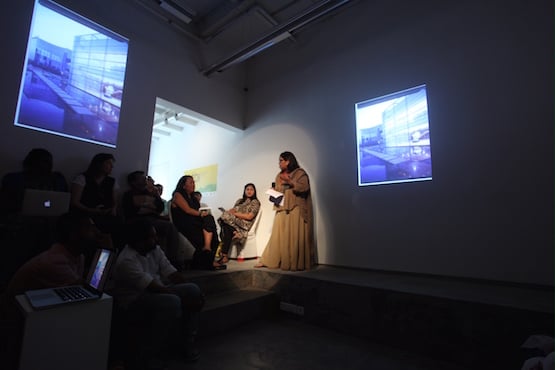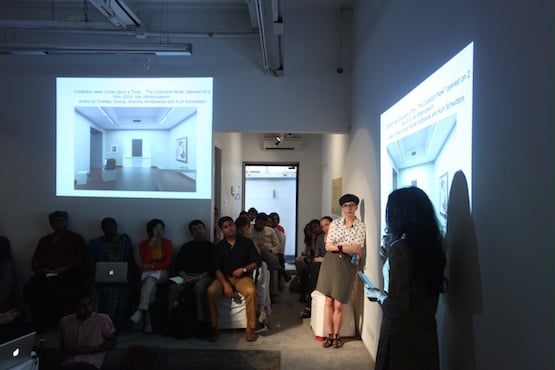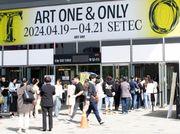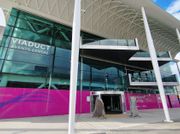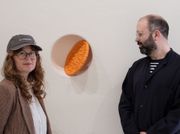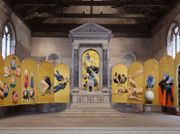Prateek and Priyanka Raja
Husband and wife duo, Prateek and Priyanka Raja, founded the influential Experimenter
gallery in Kolkata in 2009. With a commitment to presenting the best contemporary art in South East Asia and a rigorous and engaging curatorial program, Experimenter has forged a reputation as one of India’s leading contemporary art galleries. They represent some of the best contemporary artists from South Asia and beyond including Bani Abidi, Raqs Media Collective, CAMP, Mehreen Murtaza and Hajra Wahed.
2012 saw the launch of the Experimenter Curators' Hub (ECH), bringing together some of the best thinkers in contemporary art from around the world to discuss and debate curatorial practice. A highly anticipated annual event, ECH is well regarded for its critical engagement with curatorial practice in both India and beyond.
2015 marks a significant year for Experimenter, with three of their artists represented at the 56th Venice Biennale and the 5th iteration of the celebrated ECH.
It was great to talk to Prateek and Priyanka about the gallery, the success of the ECH and more generally about the contemporary art scene in India.
Tell us a bit about yourselves. I understand you both worked in the corporate world before studying Contemporary Asian Art at Sotheby’s and then opening the gallery. Where did the passion for contemporary art begin?
Our corporate careers were we feel, mere stepping stones towards an urge to work together, a dream that we had from our teenage years. And although I had made the transition from a corporate career with the Tata Group into my family business of handloom textiles, Priyanka was in a high growth corporate career with Proctor & Gamble as its India Media Manager. The need to create Experimenter together came from the thought that both of us had a certain vision that needed a degree of immersive experience that was only possible to realise when we worked, or at that time, thought about contemporary art together. The urgency to show what we believed in, was stronger than our urge to follow our corporate careers. On a personal level, we were young, with a certain risk taking ability, had our educations to fall back on in case this did not work, and most importantly here was an idea that was compelling and something that, we both thought, gave us an opportunity to work together and live together without the constraints of usual businesses and with certain privileges of creative and other forms of freedom that are rarely available to most other professions.
Experimenter Curators' Hub, 2014. Image courtesy, Experimenter.
You founded Experimenter gallery in 2009. What was the founding ethos of the gallery? And do you feel you have achieved this?
We like imbalances. They make opportunities possible and allow for things that would not be realised in perfectly balanced conditions to actually thrive. Experimenter is a superb example of this. The essence of Experimenter comes from a very simple conceptual framework that guides us, and the name itself indicates that the choices we make are extremely personal, where the last two letters of the name makes it a person more than an entity. Hence decisions will always reflect a personal choice or aesthetic. We look forward to challenging ourselves with every exhibition and with every artist we work with. The idea is to confront the unexpected and broaden and question the views of not only the viewers of our program but also of ourselves. In all these aspects we have been as true to ourselves as possible through the years.
Reflecting on the last 6 years, what are some of the exhibitions you are most proud of?
Every exhibition is a moment of pride. The germination of an exhibition often takes place from a sublime idea in the mind of the artist, and then births itself through the exhibition. This entire process, always months and sometimes years long, is the most beautiful part of our jobs. When we look at a show and see that what we had set out to achieve is true to the vision of the artist, it feels very very good. Shows of our artists that are organized at institutions and public and private foundations are rather rewarding as one feels a certain sense of appreciation, but these I feel are milestones on an ongoing journey that will throw up more and more challenges and an even greater sense of satisfaction.
Experimenter Curators' Hub, 2014. Image courtesy, Experimenter.
Is there a particular quality that defines an Experimenter artist?
I guess that would have to be intellect; each and every one of the artists we work has an amazing mind - they are people whose ideas open up new ways of seeing and new possibilities. It is an absolute privilege to be surrounded some of the most fascinating thinkers. We are in complete awe of how they view the world, what kind of questions they raise and the lens through which they see everything around us. For us, this is the most attractive aspect of working with contemporary art.
From the start you have always made an effort to be international, showing at Frieze in your first year and since at a number of international fairs. Three years after opening the gallery you launched the Experimenters Curators' Hub bringing together the best in international curatorial thinking to Kolkata. How important is this international dialogue to the success of the gallery?
We started Experimenter Curators' Hub in 2011 in an attempt to have a dialogue on curatorial practice and we are extremely proud to have hosted them and at the same time grateful to the curators from all over the world who have come to ECH. The international nature of contemporary art makes it possible to communicate in a global language. It necessitates a dialogue across geographies because the concerns that curators raise in their exhibitions are not about a certain geographical area but concerns of all of us, from all over the world. Hence it is important to have an international dialogue. Also, I feel Experimenter has a voice, something that is distinctly its own and it is important to us individually that we put that voice out there, to be appreciated or criticized, but most importantly to be heard.
Tell us about the decision to launch the ECH and what you hoped to achieve?
We have to recognize that the art infrastructure is and continues to remain abysmal in our country. In the absence of the same, it is crucial that private organizations in whatever their capacities allow fill that void in the interim, in the larger interest of the social and cultural fabric of the nation. We are very happy to take this lead and are hugely indebted to all the partners who enable this to happen. We started with a simple idea, a basic need to discuss curatorial practice in India and it is important for us to be able to bring to the country some of the most influential minds in contemporary practice we have access to and for us, as individuals, to make accessible that growing pool of people - first to our own city and to the rest of the country. For us it is a way of going to school every year, where we are just participants to the discussions like all other participants and equally keen to know how and what informs the conceptual framework of what curators do and to share that knowledge in an intense hub-like huddle over 2-3 days.
Experimenter Curators' Hub, 2014. Image courtesy, Experimenter.
And what do you think has been the greatest impact of the ECH?
The ECH has become one of the most critical and important venues for discussing curatorial practice in the region and is a much-awaited event in the arts calendar. It is very difficult to tangibly quantify the direct implications of such an endeavor. I am confident however, that the ECH offers the possibilities of future connections and collaborations and opens new questions, concerns and opportunities in the minds of the audience - the majority of which are curators, artists, other gallerists and people from the art world. The ECH is focused on creating a sort of intense retreat to think about art, the idea of exhibition making and the form in which one puts these amazing exhibitions together. It does so by being a facilitator for dialogue, debate and discussion and will continue in that direction.
It provides a space for dialogue and debate which is free-flowing and unmoderated. At the end of each day, there is a panel discussion that discusses the issues thrown up during the day. Thereafter several conversations have then been taken forward sometimes between curators and often in several other ways. The ECH is as intangible as it is tangible. It attracts some of the most interesting minds in contemporary art and it lives much beyond the two days of the hub. The videos of the presentations and the discussions are uploaded online and become valuable archives for other people who are not in attendance. The ECH gives an opportunity for all participants to interact and find a voice that may or may not be common. To some participants it may offer a view of the art world that can be missed in only exhibition making and therefore the dialogue becomes important to have.
How are curators selected to take part in the ECH?
We follow the work of the curators on ECH for a while, some for longer and some for much lesser time, but we look at trying to form a way of making a good balance and providing for a range of curatorial practice. Also, every year there is a broad focus or interest that we follow in the process of selection.
How would you describe the Indian art scene today, and what are your hopes for the future?
The Indian contemporary scene is at a very crucial juncture and has been so for a few years now. These are important transitional years and what the protagonists do now will have a definite impact over the next few years. We think other than the responsibilities of how our art looks and how it is presented, it is also important to think of our past and to contemplate our future. We look forward to the coming years with a sense of excitement as we see a robust artistic practice emerging with hopefully greater support from the ministry of culture and long term investments in building public institutions for contemporary art and a larger number of private and public collections across the country.
What is the next major project you are working on at the gallery?
A week after the ECH we open a new solo exhibition, Anywhere but Here by Julien Segard who is a French artist living in New Delhi. Following this we hold our annual experimental film exhibition, Filament in September and then attend Frieze London in October. Later in the year we have a solo exhibition by Bani Abidi that stretches into the new year followed by the India Art Fair and then the second solo show at Experimenter by Tunisian born and Berlin based artist, Nadia Kaabi-Linke. Then two fairs in March, Art Dubai and Art Basel Hong Kong. So a very busy year awaits us, a lot of things are slated and our hands are full. —[O]

